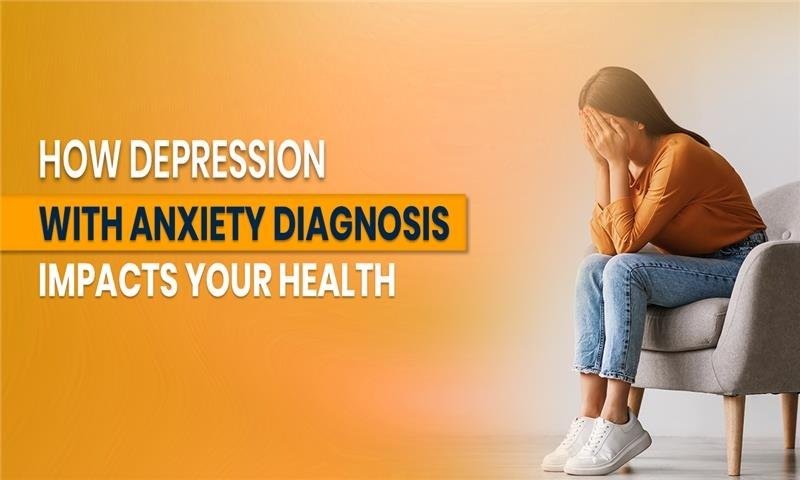Mental health issues like depression accompanied by anxiety are more prevalent today than ever before. This dual diagnosis often goes unnoticed, as its symptoms can be mistaken for other conditions or simply overlooked. However, depression with anxiety is a legitimate, complex issue that affects both the mind and body. Experiencing this condition can feel like being trapped in a never-ending cycle of worry, fear, and sadness.
Whether you’re personally affected or know someone who is, understanding the impact of depression with anxiety on overall well-being is crucial. More importantly, it’s essential to know how to manage it effectively. Continue reading to gain a thorough understanding of this condition and discover actionable strategies for dealing with it.
What Is Depression with Anxiety Diagnosis?
When you’re diagnosed with depression with anxiety, you’re dealing with two overlapping conditions: depression and anxiety. These two can feed off each other, creating a vicious cycle that is hard to escape.
Depression with anxiety symptoms can look different from person to person, but common signs include:
- Depression: Feelings of sadness, hopelessness, lack of energy, and loss of interest in activities.
- Anxiety: Excessive worry, fear, restlessness, and physical symptoms such as a racing heart, muscle tension, or sweating.
When these symptoms occur together, the combination can make life feel overwhelming. The condition is often diagnosed using the depression with anxiety ICD-10 classification system, which helps healthcare providers understand the specific symptoms and conditions you may be experiencing.
The Impact of Major Depression with Anxiety (ICD-10) on Your Health
Major depressive disorder Anxiety is not just a mental health issue. It affects your entire well-being, from your emotional state to your physical health. Here are some ways it impacts your life:
- Mental and Emotional Drain: The constant tug-of-war between feelings of sadness and anxiety can cause emotional burnout. You’re stuck between low energy and worry, making it hard to concentrate or perform daily tasks.
- Physical Symptoms: Anxiety often leads to physical manifestations like headaches, muscle aches, and stomach issues. Chronic stress caused by both depression and anxiety can weaken your immune system, leaving you more susceptible to illnesses.
- Sleep Disruption: Anxiety can cause you to feel restless at night, while depression might make you want to sleep all day. As a result, your sleep patterns are disturbed, which only adds to the emotional and physical strain.
- Social Isolation: With major depressive disorder and anxiety, social withdrawal can become an issue. You may isolate yourself from friends and family due to feelings of inadequacy or a lack of energy, which can exacerbate depression and anxiety.
- Reduced Quality of Life: Over time, the effects of depression and anxiety can lower your overall quality of life. From work performance to personal relationships, both conditions can leave you feeling stuck in a cycle of negativity.
Understanding Depression with Anxiety Medication
One of the most effective ways to manage depression with anxiety symptoms is through medication. While therapy and lifestyle changes are important, medication can help regulate the brain chemicals responsible for mood and anxiety regulation.
Depression with anxiety medication typically includes:
- Antidepressants (SSRIs or SNRIs): These medications help balance serotonin and norepinephrine levels in the brain, which can ease both depression and anxiety symptoms.
- Anti-anxiety Medications: These can provide immediate relief for anxiety symptoms but are generally prescribed for short-term use to avoid dependency.
While medication plays a critical role in treating major depression with anxiety, it’s important to work closely with a doctor to find the right balance and avoid side effects.
How to Cope with Major Depression with Anxiety ICD-10
If you’re dealing with major depression with anxiety ICD-10, you’re not alone. Many people experience this dual diagnosis, and with the right support and treatment, it’s entirely possible to regain control over your life. Here’s what you can do:
- Seek Professional Help
The first and most important step is to seek professional help. A psychologist or psychiatrist can diagnose your condition and help determine the best course of treatment. Cognitive Behavioral Therapy (CBT) and medication are often used to treat depression with anxiety effectively. - Exercise Regularly
Physical activity is one of the best ways to fight depression and anxiety. It releases endorphins, the body’s natural mood elevators, and can help reduce anxiety over time. - Practice Mindfulness
Mindfulness practices like yoga or meditation can help ground you in the present moment and reduce the chronic worrying associated with anxiety. This can improve both your emotional and physical well-being. - Create a Support System
Surround yourself with people who understand your condition and can provide support. This might include friends, family, or a support group for those with anxiety and depression. - Prioritize Self-Care
Taking care of yourself isn’t just about physical health; it’s about emotional well-being too. Make time for things that bring you joy, even if they seem small. Self-care is a critical part of managing depression with anxiety.
The Role of Athena Luxus in Your Healing Journey
At Athena Luxus, we believe in offering luxury treatment that goes beyond what is traditionally offered. If you are struggling with depression with an anxiety diagnosis, our premium mental health services are designed to help you heal in an environment of comfort and care.
We provide a holistic approach to mental health that includes personalized therapy, expert care, and exclusive treatment plans that cater to your unique needs. Whether you are seeking relief from depression with anxiety symptoms or need a more in-depth depression with anxiety medication, Athena Luxus is here to provide you with the tools and support you need to recover.
Conclusion
Living with depression and anxiety can feel overwhelming, but recovery is entirely possible with the right support and treatment. At Athena Luxus, we provide luxury treatment for individuals facing depression and anxiety, focusing on a holistic and personalized healing approach tailored to your unique needs.
If you’re ready to take the next step in your recovery journey or want more information on how we can help, reach out to us today at Athena Luxus. Begin your healing path with us now.
Patient Experiences
- Ravi Sharma, from Delhi:
I’ve been living with depression with anxiety symptoms for years. After coming to Athena Luxus, I found the support and care I needed. Their luxury treatment made all the difference in my recovery.” - Neha Agarwal, from Mumbai:
Athena Luxus helped me understand my major depressive disorder and anxiety and find a treatment plan that works. The exclusive care they provide is truly one-of-a-kind. - Amit Kumar, from Kolkata:
When I was diagnosed with major depression with anxiety ICD-10, I didn’t know where to turn. Athena Luxus gave me the support I needed to overcome this, and I’ll always be grateful.” - Priya Verma, from Bangalore:
“The team at Athena Luxus is phenomenal. They provided me with personalized treatment and helped me manage depression with anxiety in a way that’s both effective and compassionate.
Facing these challenges? We provide customized treatment plans to assist you or your loved ones. Our expert programs focus on
Alcohol Detox Treatment
Cocaine Addiction Treatment
Drug Addiction Treatment
Heroin Addiction Treatment



